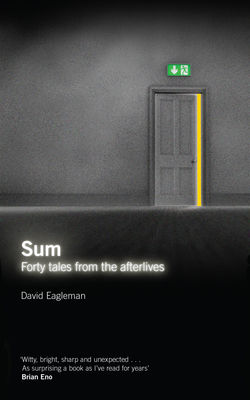Читать книгу Sum - David Eagleman - Страница 11
На сайте Литреса книга снята с продажи.
Metamorphosis
ОглавлениеThere are three deaths. The first is when the body ceases to function. The second is when the body is consigned to the grave. The third is that moment, sometime in the future, when your name is spoken for the last time.
So you wait in this lobby until the third death. There are long tables with coffee, tea, and cookies; you can help yourself. There are people here from all around the world, and with a little effort you can strike up convivial small talk. Just be aware that your conversation may be interrupted at any moment by the Callers, who broadcast your new friend’s name to indicate that there will never again be another remembrance of him by anyone on the Earth. Your friend slumps, face like a shattered and reglued plate, saddened even though the Callers tell him kindly that he’s off to a better place. No one knows where that better place is or what it offers, because no one exiting through that door has returned to tell us. Tragically, many people leave just as their loved ones arrive, since the loved ones were the only ones doing the remembering. We all wag our heads at that typical timing.
The whole place looks like an infinite airport waiting area. There are many famous people from the history books here. If you get bored, you can strike out in any given direction, past aisles and aisles of seats. After many days of walking, you’ll start to notice that people look different, and you’ll hear the tones of foreign languages. People congregate among their own kind, and one sees the spontaneous emergence of territories that mirror the pattern on the surface of the planet: With the exception of the oceans, you’re traversing a map of the Earth. There are no time zones here. No one sleeps, even though they mostly wish they could. The place is evenly lit by fluorescent lights.
Not everyone is sad when the Callers enter the room and shout out the next list of names. On the contrary, some people beg and plead, prostrating themselves at the Callers’ feet. These are generally the folks who have been here a long time, too long, especially those who are remembered for unfair reasons. For example, take the farmer over there, who drowned in a small river two hundred years ago. Now his farm is the site of a small college, and the tour guides each week tell his story. So he’s stuck and he’s miserable. The more his story is told, the more the details drift. He is utterly alienated from his name; it is no longer identical with him but continues to bind. The cheerless woman across the way is praised as a saint, even though the roads in her heart were complicated. The gray-haired man at the vending machine was lionized as a war hero, then demonized as a warlord, and finally canonized as a necessary firebrand between two moments in history. He waits with aching heart for his statues to fall. And that is the curse of this room: since we live in the heads of those who remember us, we lose control of our lives and become who they want us to be.
